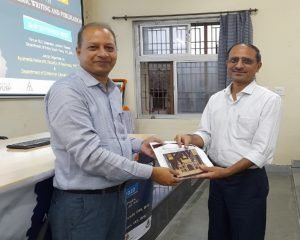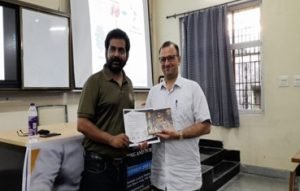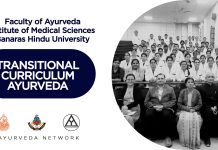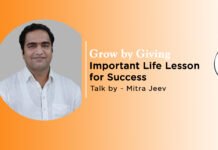WORKSHOP ON
ACADEMIC WRITING AND PUBLICATION
 A Six-day workshop on Academic writing and publication jointly organized by Ayurveda Network, Faculty of Ayurveda, IMS, BHU, and Department of Extension Education IAS, BHU. Where twenty-five assistant professors and Ph.D. Scholars of Ayurveda were trained in academic writing and publications. The workshop was organized from the 12th -17th of September 2022 in the Department of Kriya Sharir, Faculty of Ayurveda, Institute of Medical Sciences, Banaras Hindu University.
A Six-day workshop on Academic writing and publication jointly organized by Ayurveda Network, Faculty of Ayurveda, IMS, BHU, and Department of Extension Education IAS, BHU. Where twenty-five assistant professors and Ph.D. Scholars of Ayurveda were trained in academic writing and publications. The workshop was organized from the 12th -17th of September 2022 in the Department of Kriya Sharir, Faculty of Ayurveda, Institute of Medical Sciences, Banaras Hindu University.
12th September 2022
 The workshop started with the great inaugural session with the welcome of Chief Guest Prof. K.N. Dwivedi Dean of Faculty of Ayurveda and the speakers and a warm welcome to all the participants. After the inaugural session, a pre-quiz link having 10 questions related to writing and publications was shared with all participants to assess their baseline knowledge.
The workshop started with the great inaugural session with the welcome of Chief Guest Prof. K.N. Dwivedi Dean of Faculty of Ayurveda and the speakers and a warm welcome to all the participants. After the inaugural session, a pre-quiz link having 10 questions related to writing and publications was shared with all participants to assess their baseline knowledge.
 The first day began with a presentation by Prof. Ajit Mishra of IIT, BHU. He delved on the Importance of Language in Academic Writing and shared his experiences in innovative ways of writing. He started with the importance of the word, phrases, clauses, sentences, and paragraph by using several tools and books such as Adrian Wall work’s “English for Writing Research Papers” and “The Elements of Style” by Strunk W., Jr. and White E.B. show how to write effectively. Apart from this he also mentioned Academic Word List and Academic Vocabulary List. He also emphasized the magic of content and structured words in writing. The best of this lecture was that all the participants did a hands-on approach regarding the dos and don’ts while writing a paper.
The first day began with a presentation by Prof. Ajit Mishra of IIT, BHU. He delved on the Importance of Language in Academic Writing and shared his experiences in innovative ways of writing. He started with the importance of the word, phrases, clauses, sentences, and paragraph by using several tools and books such as Adrian Wall work’s “English for Writing Research Papers” and “The Elements of Style” by Strunk W., Jr. and White E.B. show how to write effectively. Apart from this he also mentioned Academic Word List and Academic Vocabulary List. He also emphasized the magic of content and structured words in writing. The best of this lecture was that all the participants did a hands-on approach regarding the dos and don’ts while writing a paper.
13th September 2022
On the second day Prof. Manoj Kumar, Department of Shalakya Tantra IMS, BHU and co-coordinator of Ayurveda Network. Delivered a fruitful lecture on features of MS Word and the usefulness of styles, views, and many more components of MS Word and conducted 10 minutes of hands-on training about the above-mentioned topics. He also mentioned how to make a well-formatted document by inserting tables, allotting serial numbers to figures and tables, styles, and navigation of the whole document so that the editing of the whole document can be done systematically with lesser time and effort. He also mentioned different referencing tools such as Reference Manager and Mendeley where the participants develop a thorough understanding of different types of referencing styles like APA, AMA, and MLA. The best of the session was each and every participant get an opportunity to clarify their doubts regarding referencing Samhita and Sutrasthan while writing Articles of Ayurveda.
On the Second session of that Day, there was a session by Prof. Kishore Patwardhan, Department of Kriya Sharir, Faculty of Ayurveda, IMS, BHU coordinator of Ayurveda Network. The theme of the session was “choosing the right journal for publication”. He discussed the difference between scholarly literature and popular literature. He introduces the key factors which should be known before publishing a paper like Impact Factor, SciMago Journal Rank, Score Normalized Impact Factor and Journal Metrics, etc very thoroughly and practically. Sir has described how to search about recent and updated information on different websites and databases like IMPAT, and Medline Plus. He has mentioned how to search for articles in PubMed, PubMed Central and Scopus with the help of Boolean Operator and MeSH Terms. He has conducted another session where he explained how we can use Scopus to analyse the profile of an institution as well as author. Also conducted a hands-on practice on writing an article in which every participant had to write the introduction of one paragraph on any topic in which participants has to mention the key components.
 The second session was conducted by Dr. Ashish Yadav, Biostatistics, IMS, BHU on the theme “Important Statistical Tools used in Health Research” and “Analysing the Data using Statistical Software”. He discussed types of descriptive analysis like measures of frequency, Central tendency, dispersion, contingency tables, scatter plots etc. and different types of correlation. He explained the concept of hypothesis testing, regression analysis and meta-analysis. He also emphasized on Box and Whisker plot for outliers and skewed distribution.
The second session was conducted by Dr. Ashish Yadav, Biostatistics, IMS, BHU on the theme “Important Statistical Tools used in Health Research” and “Analysing the Data using Statistical Software”. He discussed types of descriptive analysis like measures of frequency, Central tendency, dispersion, contingency tables, scatter plots etc. and different types of correlation. He explained the concept of hypothesis testing, regression analysis and meta-analysis. He also emphasized on Box and Whisker plot for outliers and skewed distribution.
14th September
 The third day of the workshop began with the session of Dr. KHVSSN Murthy, Professor Department of Kaya Chikitsa and co-coordinator of Ayurveda Network. He delivered a lecture on the IMRD (Introduction, Materials & Methods, Results, and Discussion) structure of the scientific paper. He discussed elements of scientific paper writing and the major section of a research paper. He described deeply the review of the literature, discussion, conclusion and references for a good scientific paper.
The third day of the workshop began with the session of Dr. KHVSSN Murthy, Professor Department of Kaya Chikitsa and co-coordinator of Ayurveda Network. He delivered a lecture on the IMRD (Introduction, Materials & Methods, Results, and Discussion) structure of the scientific paper. He discussed elements of scientific paper writing and the major section of a research paper. He described deeply the review of the literature, discussion, conclusion and references for a good scientific paper.
 The second session was taken by Dr. SS Chakrabarti, Department of Geriatrics, IMS, BHU. The theme of this session was “Peer Review in Health Research”. Sir has started with the definition of peer review along with values of peer review. Then he mentioned the drawbacks and approaches in peer review very thoroughly. He described different types of peer review like open peer review, self-directed peer review, and post-publication peer review. Sir has also discussed the expectations of a peer reviewer from the authors of the paper.
The second session was taken by Dr. SS Chakrabarti, Department of Geriatrics, IMS, BHU. The theme of this session was “Peer Review in Health Research”. Sir has started with the definition of peer review along with values of peer review. Then he mentioned the drawbacks and approaches in peer review very thoroughly. He described different types of peer review like open peer review, self-directed peer review, and post-publication peer review. Sir has also discussed the expectations of a peer reviewer from the authors of the paper.
15th September
The session began with a presentation by Prof. Sanjeev Rastogi of State Ayurvedic College, Lucknow on the theme of Literature search using Various Databases. The session was conducted through Ayurveda Network online mode. He discussed on literature search using various Data Bases and his shared experience on the topic with extraordinary communication skills. Describe the concept with various examples to show the literature search in an effective manner. He emphasized the different types of online databases for literature searches and discussed the types of referencing styles.
 The second session was conducted by Dr. Rajeev Mishra, MMV BHU on the Graphical representation of Data for Scientific Publication. He emphasized the graphical abstract and relevance of graphs and tables in a paper. As all the journals have their own guideline of limited space for words so sir has mentioned some key ideas and ABCs of any figure which stands for Attractive, Brief, and Clear. He has mentioned the different software for the representation of molecules and gene expression apart from this sir has also described that every chart has a specific meaning and where to use different graphs and charts for example– Pie charts, bar diagram pictorial representations, etc.
The second session was conducted by Dr. Rajeev Mishra, MMV BHU on the Graphical representation of Data for Scientific Publication. He emphasized the graphical abstract and relevance of graphs and tables in a paper. As all the journals have their own guideline of limited space for words so sir has mentioned some key ideas and ABCs of any figure which stands for Attractive, Brief, and Clear. He has mentioned the different software for the representation of molecules and gene expression apart from this sir has also described that every chart has a specific meaning and where to use different graphs and charts for example– Pie charts, bar diagram pictorial representations, etc.
16th September
 The first session started with the lecture of Prof. KS Dhiman Shalakya Tantra, IMS, BHU on the theme of Different funding opportunities for Aayush /Health/ Biomedical Research. He has described different funding agencies for taking grants for research works. Such as the Indian Council of Medical Research (ICMR), DRDO, CSIR, AICTE, DST, Ministry of Food Processing Industries, ISRO, etc. He discussed the scientific methods and emphasized the thrust areas while writing a research proposal to funding agencies.
The first session started with the lecture of Prof. KS Dhiman Shalakya Tantra, IMS, BHU on the theme of Different funding opportunities for Aayush /Health/ Biomedical Research. He has described different funding agencies for taking grants for research works. Such as the Indian Council of Medical Research (ICMR), DRDO, CSIR, AICTE, DST, Ministry of Food Processing Industries, ISRO, etc. He discussed the scientific methods and emphasized the thrust areas while writing a research proposal to funding agencies.
 The second session of this day was taken by Prof. Prashant Shukla, IIT, BHU on the theme “How to write a Proposal for Research Grant”. Sir has talked about the Prerequisites of the Research Proposal, what are the key elements involved in the research process including sufficient information for the readers to evaluate the proposed study. The methodology should be sound. Quality of proposal writing, components of research proposal with some more examples of research titles.
The second session of this day was taken by Prof. Prashant Shukla, IIT, BHU on the theme “How to write a Proposal for Research Grant”. Sir has talked about the Prerequisites of the Research Proposal, what are the key elements involved in the research process including sufficient information for the readers to evaluate the proposed study. The methodology should be sound. Quality of proposal writing, components of research proposal with some more examples of research titles.
17th September
 On the sixth and the last day first session was conducted by Professor Manoj Pandey, Institute of Medical Sciences, BHU. He delivered on “Ethics and Misconducts in Science” applicable to different aspects of integrity. He discussed research ethics violation of ethics in research and Publication he described the ethical aspect involved in different clinical trials. He also explained about different types of plagiarism such as Scientific Plagiarism in India, falsification, and fabrication such as Salami Slicing etc. very deeply.
On the sixth and the last day first session was conducted by Professor Manoj Pandey, Institute of Medical Sciences, BHU. He delivered on “Ethics and Misconducts in Science” applicable to different aspects of integrity. He discussed research ethics violation of ethics in research and Publication he described the ethical aspect involved in different clinical trials. He also explained about different types of plagiarism such as Scientific Plagiarism in India, falsification, and fabrication such as Salami Slicing etc. very deeply.
 On the last day of the Workshop second session was conducted by Professor Kalyan Ghadei, Head Department of Extension Education, Institute of Agriculture Sciences, Banaras Hindu University. His topic of the presentation was Web Questionnaire: Preparation and Implementation. He described very deeply the purpose of web questionnaires, guidelines for designing web questionnaires, implementation of web questionnaires, and different types of survey tools. He also explained the arrangement of questions on web pages. He suggested a book to all the participants “Surveys the Tailored Design Method” by Don A. Dillman and others. He also mentioned informal criteria for Attitude statements by Wang 1932, Thurstone and Chave 1929 etc.
On the last day of the Workshop second session was conducted by Professor Kalyan Ghadei, Head Department of Extension Education, Institute of Agriculture Sciences, Banaras Hindu University. His topic of the presentation was Web Questionnaire: Preparation and Implementation. He described very deeply the purpose of web questionnaires, guidelines for designing web questionnaires, implementation of web questionnaires, and different types of survey tools. He also explained the arrangement of questions on web pages. He suggested a book to all the participants “Surveys the Tailored Design Method” by Don A. Dillman and others. He also mentioned informal criteria for Attitude statements by Wang 1932, Thurstone and Chave 1929 etc.
 In the last session of the workshop, Sri Duvvuri Venu Gopal, Deputy Registrar (Development), BHU has delivered lecture on “free and open-source research tools”. It was an introductory session with numerous learning applications that is quite helpful for both teachers and students conducted by Mr. Venugopal. He talks about a variety of open-source programs that can be used for both study and education such as Source Forge, pdf drive for free books accesses, JabRef for creating bibliographic databases. His lecture was extremely useful for those studying open-source operating systems and other computer-related advances in technology. Various statistical tools for measuring variables are covered by him. E.g., PSPP, EpiInfo/ OpenEpi- (medical statistics), GNU Plot.
In the last session of the workshop, Sri Duvvuri Venu Gopal, Deputy Registrar (Development), BHU has delivered lecture on “free and open-source research tools”. It was an introductory session with numerous learning applications that is quite helpful for both teachers and students conducted by Mr. Venugopal. He talks about a variety of open-source programs that can be used for both study and education such as Source Forge, pdf drive for free books accesses, JabRef for creating bibliographic databases. His lecture was extremely useful for those studying open-source operating systems and other computer-related advances in technology. Various statistical tools for measuring variables are covered by him. E.g., PSPP, EpiInfo/ OpenEpi- (medical statistics), GNU Plot.
The participant gave their feedback and shared their overwhelming response on the workshop. Participants expressed their gratitude and appreciation towards content, way of teaching, time utilization and other factors. At the end of the workshop post quiz link were shared among the participants.
List of Participants
| Name | Name of the Department | Designation |
| Dr. Sanath Kumar T | Agad Tantra | Assistant Professor |
| Dr. Ravi Shankar Khatri | Kaumarabhritya-Balaroga | Assistant Professor |
| Dr. Preeti Chouhan | Prasuti Tantra and Striroga | Assistant Professor |
| Dr. Mamta Tiwari | Svasthavritta | Assistant Professor |
| Dr. Kalpana Patni | Kaumarabhritya-Balaroga | Assistant Professor |
| Lakshmi | Rachana Sharir | Assistant Professor |
| Dr. Kanchan Chowdhury | Svasthavritta | Assistant Professor |
| Shilpa Govind Patil | Rasa Shastra and Bhaishajya Kalpana | Assistant Professor |
| Dr. Bhola Nath Maurya | Sangyaharan | Assistant Professor |
| Subhra Jyoti Chakraborty | Kayachikitsa | Ph.D. Scholar |
| Rohit Kumar | Kayachikitsa | Ph.D. Scholar |
| Priyanka Joshi | Kayachikitsa | Ph.D. Scholar |
| Neha Singh | Kriya Sharir | Ph.D. Scholar |
| Sudha Yadav | Kriya Sharir | Ph.D. Scholar |
| Pankaj Pal | Kriya Sharir | Ph.D. Scholar |
| Kajal Yadav | Kriya Sharir | Ph.D. Scholar |
| Shraddha Mishra | Kriya Sharir | Ph.D. Scholar |
| Amit Kumar | Kriya Sharir | Ph.D. Scholar |
| Nidhi Bajpai | Prasuti Tantra | Ph.D. Scholar |
| Afroja Yeasmin Akhtar Roji | Samhita and Sanskrit | Ph.D. Scholar |
| Anand Jaiswal | Samhita and Sanskrit | Ph.D. Scholar |
| Dinesh Kumar Meena | Siddhant Darshan | Assistant Professor |
| Ashish Bhadula | Swasthavritta & Yoga | Ph.D. Scholar |
| Dr. Ringzin Lamo | Agada Tantra | Assistant Professor |
| Vinod Patel | Swasthavritta & Yoga | Ph.D. Scholar |
| Mrityunjay Patidar | Swasthavritta & Yoga | Ph.D. Scholar |
| Sr. No. | Pre-Workshop quiz scores | Post Workshop quiz scores |
| 1 | 70 | 100 |
| 2 | 80 | 90 |
| 3 | 40 | 90 |
| 4 | 100 | 100 |
| 5 | 80 | 100 |
| 6 | 70 | 90 |
| 7 | 70 | 60 |
| 8 | 60 | 50 |
| 9 | 60 | 90 |
| 10 | 60 | 80 |
| 11 | 70 | 80 |
| 12 | 60 | 90 |
| 13 | 100 | 100 |
| 14 | 70 | 80 |
| 15 | 60 | 40 |
| 16 | 60 | 90 |
| 17 | 70 | 70 |
| 18 | 90 | 100 |
| 19 | 80 | 80 |






